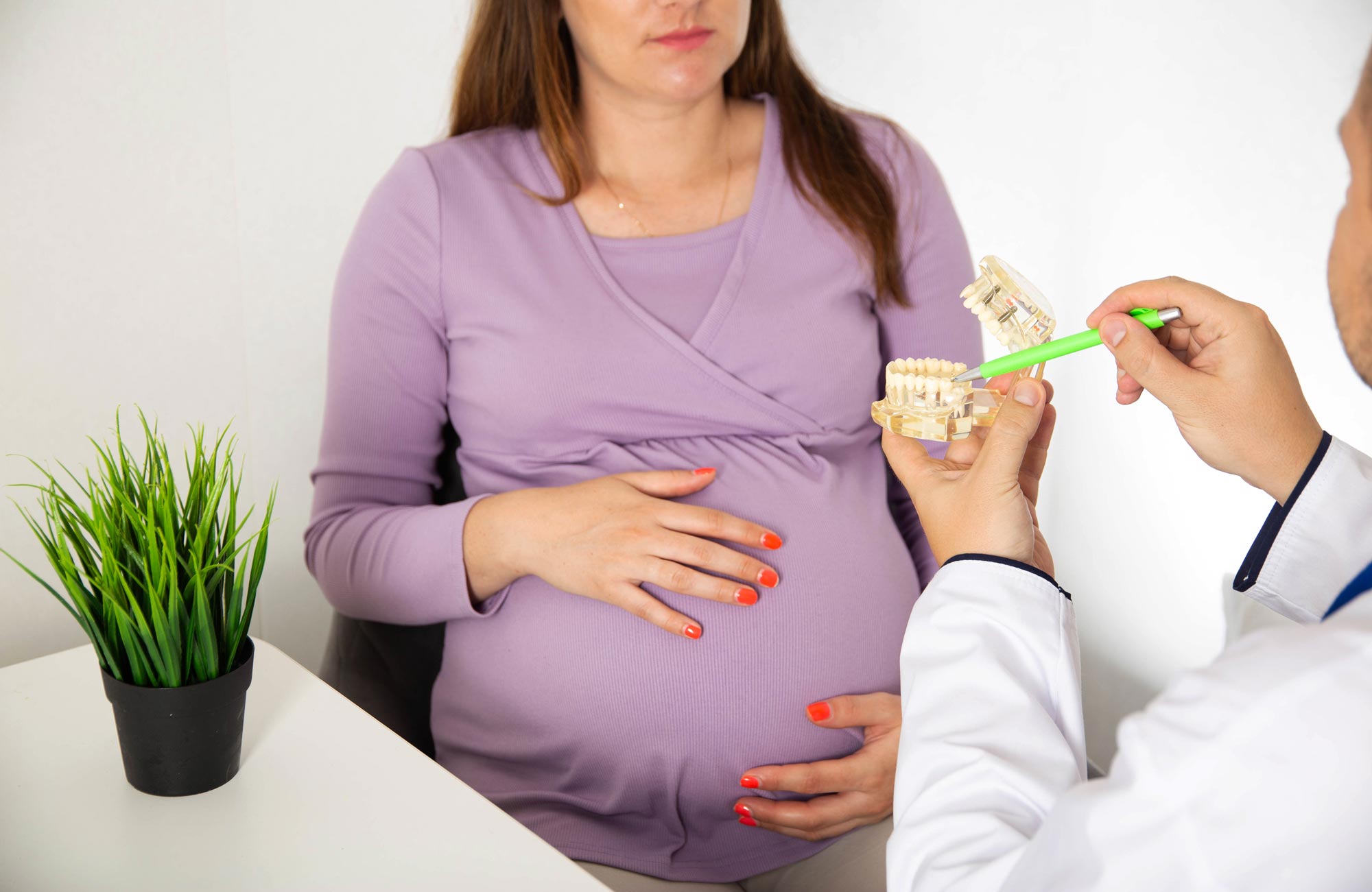Dental Care During Pregnancy
Maintaining oral health is an essential aspect of overall well-being, which becomes even more critical during pregnancy. Pregnancy induces a range of hormonal changes that can impact oral health, making pregnant individuals more susceptible to dental problems such as gingivitis, periodontitis, and dental caries. Ignoring dental care during this period can lead to serious consequences, not just for the mother but also for the developing fetus.
One reason dental care is so important during pregnancy is due to the increased risk of gum disease, which is linked to complications such as preterm birth and low birth weight. Pregnant individuals may experience “pregnancy gingivitis,” characterised by swelling, bleeding, and tenderness of the gums. Without proper treatment, this can progress to more severe conditions, jeopardising both maternal and fetal health.
Despite the importance of dental care, many pregnant individuals harbor concerns and misconceptions about visiting the dentist. Common myths include the belief that dental procedures can harm the baby or that X-rays are unsafe during pregnancy. These misconceptions often lead to the postponement or avoidance of necessary dental care, exacerbating oral health issues.
It is crucial to address these concerns with accurate information. For instance, most dental treatments, including cleanings, fillings, and even X-rays, are generally safe during pregnancy when proper precautions are taken. Dentists are trained to manage the unique needs of pregnant patients, ensuring that both mother and child remain safe and healthy.
This blog post aims to dispel myths and provide comprehensive information on dental care during pregnancy. By understanding the importance of maintaining oral health and debunking common misconceptions, pregnant individuals can make informed decisions about their dental care, ensuring a healthier pregnancy for themselves and their babies.
Benefits of Dental Visits During Pregnancy
Maintaining optimal oral health is crucial at any stage of life, but it becomes especially important during pregnancy. Hormonal changes during pregnancy can significantly impact oral health, leading to conditions such as gingivitis, periodontal disease, and an increased risk of tooth decay. Regular dental check-ups and treatments can mitigate these risks, ensuring both maternal and fetal well-being.
One of the most common oral health issues during pregnancy is gingivitis, often referred to as pregnancy gingivitis. This condition is characterised by swollen, tender, and bleeding gums, a result of increased blood flow and hormonal fluctuations. If left untreated, gingivitis can progress to more severe periodontal disease, which has been linked to adverse pregnancy outcomes such as preterm birth and low birth weight. Regular dental visits allow for early detection and management of gingivitis, thus preventing its progression.
Pregnancy can also exacerbate pre-existing dental issues or lead to new problems such as increased susceptibility to cavities. The changing hormonal environment can affect the body’s response to plaque, making it easier for cavities to form. Additionally, morning sickness and dietary changes may contribute to enamel erosion and tooth decay. Timely dental care, including professional cleanings and fluoride treatments, can help prevent these complications.
Beyond addressing specific dental issues, regular dental check-ups during pregnancy contribute to overall health. For instance, untreated oral infections can spread beyond the mouth, potentially affecting systemic health. Ensuring oral health can reduce the risk of infections that might complicate pregnancy. Moreover, dental professionals can provide valuable advice on maintaining oral hygiene and dietary habits that support both maternal and fetal health.
In summary, regular dental visits during pregnancy offer numerous benefits, from preventing and managing gingivitis and periodontal disease to reducing the risk of cavities and other oral health issues. By prioritising dental care, pregnant individuals can contribute to their overall well-being and that of their developing baby.
Tips for Maintaining Oral Health at Home
Maintaining optimal oral health during pregnancy is crucial for both the mother and the developing baby. Proper oral hygiene can prevent common dental issues that may arise due to hormonal changes. Here are some practical tips to help pregnant women take care of their teeth and gums at home.
Brushing and Flossing Techniques: It is essential to brush your teeth at least twice a day using fluoride toothpaste. Opt for a soft-bristled toothbrush to avoid gum irritation and ensure gentle yet effective cleaning. Flossing daily helps remove plaque and food particles between teeth, reducing the risk of gum disease. Consider using an antimicrobial mouthwash to further enhance oral hygiene.
Dietary Recommendations: A balanced diet plays a significant role in maintaining oral health. Include plenty of calcium-rich foods like dairy products, leafy greens, and almonds to support strong teeth and bones. Vitamin D, found in fortified foods and sunlight, aids in calcium absorption. Limit sugary snacks and beverages, as they can lead to tooth decay. Opt for healthy snacks like fruits, vegetables, and nuts that promote saliva production and help cleanse the mouth naturally.
Managing Common Pregnancy-Related Oral Issues: Morning sickness can increase the risk of enamel erosion due to stomach acids. Rinse your mouth with water or a mixture of baking soda and water after vomiting to neutralise the acid. Chewing sugar-free gum can also help stimulate saliva flow, which protects teeth. Pregnancy cravings may lead to a higher intake of sugary or acidic foods, so try to choose healthier alternatives whenever possible.
Regular Dental Check-Ups: While maintaining oral health at home is essential, regular dental check-ups should not be overlooked. Inform your dentist about your pregnancy so they can tailor your dental care accordingly. Routine cleanings and examinations are safe during pregnancy and can help identify and address any potential issues early on. Integrating dental visits into your prenatal care plan ensures comprehensive health care for you and your baby.
By following these tips, pregnant women can effectively manage their oral health, reducing the risk of complications and ensuring a healthy smile throughout their pregnancy. Prioritising dental care is a vital component of overall prenatal health.
Safety Precautions and Considerations
When it comes to dental care during pregnancy, ensuring the safety of both the mother and the developing baby is paramount. Many dental procedures are deemed safe during pregnancy, but it is essential to observe certain precautions and considerations. Regular dental check-ups and preventive cleanings are not only safe but also highly recommended to maintain oral health and prevent potential complications that could affect pregnancy.
The timing of dental visits plays a crucial role in minimising risks. The second trimester is often considered the best period for dental treatments. During this time, the risk of miscarriage has decreased, and the discomforts of early pregnancy, such as nausea, have typically subsided. Elective procedures should ideally be postponed until after delivery, while necessary treatments can usually be safely performed during the second trimester.
Regarding the use of medications and anesthetics, local anesthetics, such as lidocaine, are generally considered safe for use during pregnancy. However, it is vital to inform the dentist about the pregnancy, so they can adjust the type and amount of anesthesia accordingly. Antibiotics may sometimes be required to treat infections, and penicillin and amoxicillin are commonly prescribed as they are safe for pregnant women.
A common concern for many expectant mothers is the exposure to X-rays. Dental X-rays can be safely performed during pregnancy if necessary, but precautions should be taken to minimise exposure. The use of a lead apron and thyroid collar provides adequate protection for both the mother and the developing baby. High-quality digital X-rays, which emit significantly lower levels of radiation, are an excellent option when imaging is essential.
In conclusion, visiting the dentist while pregnant is generally safe when proper precautions are taken. Regular dental care is crucial for maintaining overall health, and by following these guidelines, expectant mothers can ensure their dental visits are both safe and effective.

